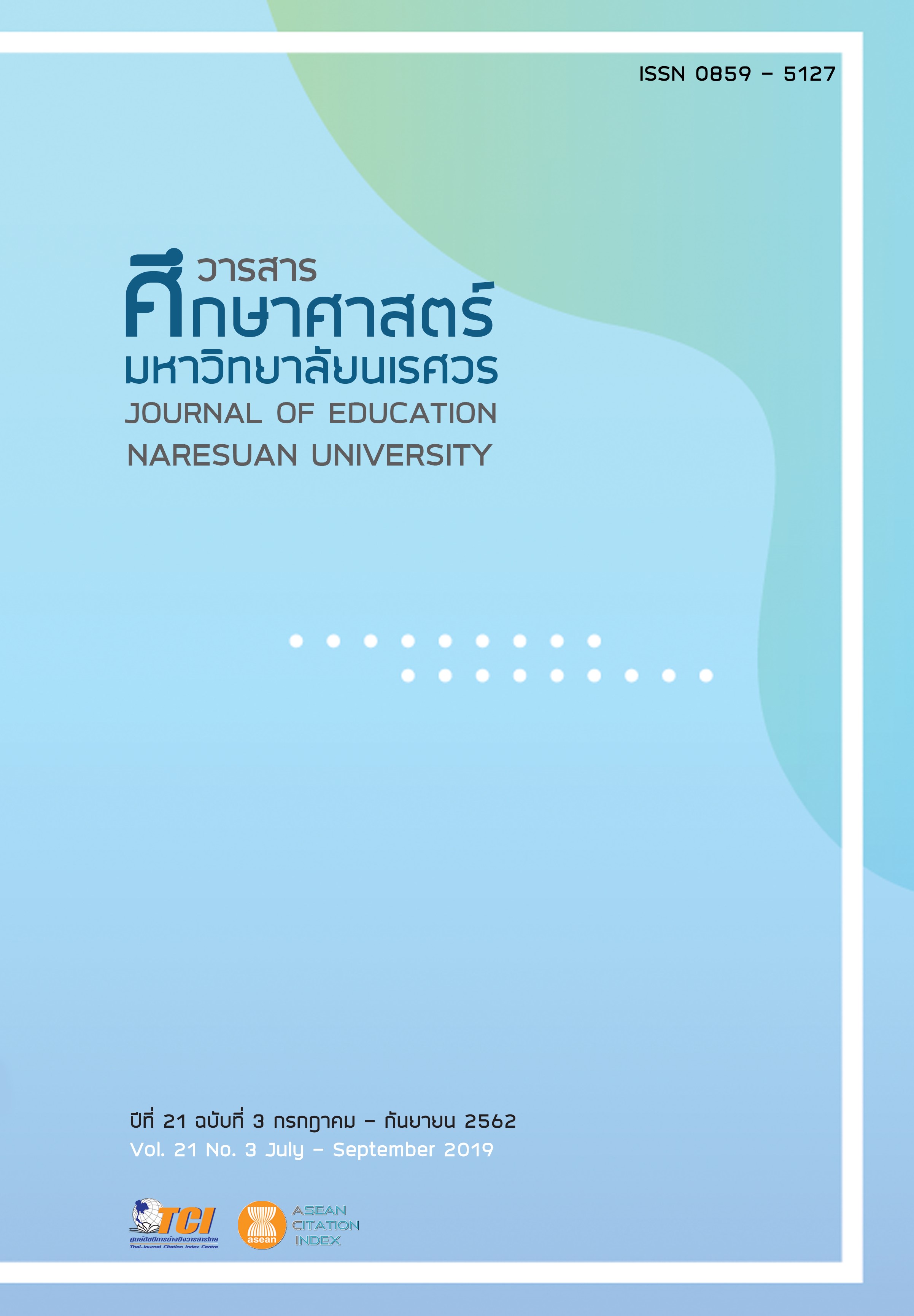ผลการจัดการเรียนรู้โดยใช้เกมการละเล่นชาติพันธุ์ เพื่อพัฒนาความคิดรวบยอดด้านประวัติศาสตร์ท้องถิ่นของนักเรียน (THE EFFECTS OF ETHNIC GAME – BASED LEARNING MANAGEMENT TO DEVELOP CONCEPTS IN LOCAL HISTORY OF THE STUDENTS)
Main Article Content
Abstract
การวิจัยครั้งนี้มีวัตถุประสงค์เพื่อ 1) สร้างแผนการจัดการเรียนรู้โดยใช้เกมการละเล่นชาติพันธุ์ เพื่อพัฒนาความคิดรวบยอดด้านประวัติศาสตร์ท้องถิ่น 2) เพื่อพัฒนาความคิดรวบยอดด้านประวัติศาสตร์ท้องถิ่นของนักเรียน 3) เพื่อเปรียบเทียบผลการเรียนรู้ ในการจัดการเรียนรู้ประวัติศาสตร์ท้องถิ่น ก่อนและหลังการใช้เกมการละเล่นชาติพันธุ์ กลุ่มตัวอย่างคือ นักเรียนชั้นประถมศึกษาปีที่ 6 โรงเรียนบ้านเทอดไทย อำเภอแม่ฟ้าหลวง จังหวัดเชียงราย ที่เรียนในภาคเรียนที่ 2 ปีการศึกษา 2559 จำนวน 36 คน ได้มาโดยการเลือกแบบเจาะจง เครื่องมือที่ใช้ในการวิจัยประกอบด้วยแผนการจัดการเรียนรู้โดยใช้เกมการละเล่นชาติพันธุ์ เพื่อพัฒนาความคิดรวบยอดด้านประวัติศาสตร์ท้องถิ่น จำนวน 9 แผน แบบทดสอบผลการเรียนรู้ เรื่อง ประวัติศาสตร์ท้องถิ่น ก่อนเรียน – หลังเรียน แบบวัดความคิดรวบยอดด้านประวัติศาสตร์ท้องถิ่น โดยใช้แผนที่ความคิด สถิติที่ใช้ในการวิเคราะห์ข้อมูลในงานวิจัยชิ้นนี้ คือ ค่าเฉลี่ย ร้อยละ ส่วนเบี่ยงเบนมาตรฐาน หาประสิทธิภาพของแผนการจัดการเรียนรู้ (E1/E2) และการทดสอบที ผลจากการวิจัย พบว่า 1) ผลการหาประสิทธิภาพของแผนการจัดการเรียนรู้ (E1/E2) เท่ากับ 94.63/96.10 ซึ่งสูงกว่าเกณฑ์ 90/90 ที่กำหนดไว้ 2) ผลการใช้เกมการละเล่นชาติพันธุ์ พบว่านักเรียนมีคะแนนความคิดรวบยอดด้านประวัติศาสตร์เฉลี่ยร้อยละ 96.10 3) นักเรียนมีความก้าวหน้าของผลการเรียนรู้หลังเรียนสูงกว่าก่อนเรียน ค่าเฉลี่ยเท่ากับ 14.18 สูงขึ้นอย่างมีนัยสำคัญทางสถิติที่ระดับ .01
THE EFFECTS OF ETHNIC GAME – BASED LEARNING MANAGEMENT TO DEVELOP CONCEPTS IN LOCAL HISTORY OF THE STUDENTS
The purposes of this research were 1) to construct the ethnic game - based to develop concept in local history learning plans, 2) to develop the concept in local history of Banthirdthai students by using the ethnic games, and 3) to compare the concept in local history after learning with the ethnic games. The sample of research was 6th grade students in the second semester of 2016 academic year at Banthirdthai School, Chiang Rai Province, selected by purposive sampling. The research instruments used in this research consisted of 1) the 9 learning plans of ethnic game - based to develop concept in local history, 2) the learning outcomes test of concept in local history, and 3) the test on concept in local history by using mind mappings. The statistics used for analyzing the collected data were mean, percentage, standard deviation, E1/E2 formula for learning plans were analyzed and t-test dependent. Research results found that; 1) the study revealed that the ethnic game - based on develop concept in local history learning plans efficiency was 94.63/96.10. This result was higher than the determined criteria 90/90, 2) the local history concept outcome after applying the ethnic games of students was at 96.10 %, and 3) the learning outcomes had been progressed after inductive learning activity at 14.18% and significantly higher at .01 level.
Article Details
The owner of the article does not copy or violate any of its copyright. If any copyright infringement occurs or prosecution, in any case, the Editorial Board is not involved in all the rights to the owner of the article to be performed.
References
2. Darkwa, K., O’Callaghan, P. W., & Tetlow, D. (2006). Phase-change drywalls in a passive-solar building. Applied Energy, 83(5), 425-435.
3. Foreman, J. (2013). Next generation technology versus the lecture. EDUCAUSE Review, 34(4), 12-22.
4. Jatuporn, O. (2015). Place-based education in the global age: Local diversity. Journal of Education Naresuan University, 17(1), 179-183. [in Thai]
5. Khammani, T. (2012). Science of teaching: knowledge for effective learning process management (16th ed.). Bangkok: Chulalongkorn University Press. [in Thai]
6. Kowatrakul, S. (1998). Education psychology. Bangkok: Chulalongkorn University Press. [in Thai]
7. Meesook, C. (2015). The learning activities to enhance student engagement by applying gamification technique on Information and Communication Technology course for Enrichment Science Class Student Mathayomsueksa 4 Anukoolnaree School (Master thesis). Maha Sarakham: Rajabhat Mahasarakham University. [in Thai]
8. Panchan, A. (2013). The development of context-based learning activity in projectile motion to develop the conceptual understanding and ability to apply knowledge in daily lives for student in Mathayomsuaksa IV (Master thesis). Phitsanulok: Naresuan University. [in Thai]
9. Panich, W. (2012). Framework for 21st century learning. Bangkok: Sodsri-Saridwongso Foundation. [in Thai]
10. Sakamoto, M. (2014). The change of ethnic relations between Khmu and Tai Lue: A study of textiles cultures in Muang Ngoen, Sayabury Province, Lao PDR. Journal of Fine Art, 5(1), 67-124. [in Thai]
11. Sermanothum, U. (2012). Traditional game plays to develop emotional system through internet network for students in grade 1, innovation demonstration school at Rajamangala University of Technology Thanyaburi (Master thesis). Bangkok: Rajamangala University of Technology Thanyaburi. [in Thai]
12. Songshean, P. (2011). Using Game Than Samong for learning Thai last-consonants system for Prathom Suksa 3 students at The Prince Royal's College, Chiang Mai Province (Master thesis). Chiang Mai: Chiang Mai University. [in Thai]
13. Soottatum, P., & Silanoi, L. (2012). Developing learning activities for teaching history subjects to Phathom Suksa IV students at Ban Noen Samnak School Manjakiri Distict Khonkaen Province using problem - based learning. Journal of Education Graduate Studies Research, KKU, 6(4), 83-95. [in Thai]
14. Soythuram, P. (2005). Play game to review the lesson. IPST Magazine, 33(134), 86-87. [in Thai]
15. Sudtayanuruk, A. (2005). History for the community: The new direction to study history. Bangkok: The Thailand Research Fund. [in Thai]
16. Uttamavetin, P. (2010). The administration model of basic education focusing on an integration of various cultures and local wisdoms for peaceful coexistence of the Minorities in Eastern Thailand. EAU Heritage Journal Social Science and Humanity, 2(2), 63-75. [in Thai]
17. Vichachai, P. (2014). Identity revitalization of ethnic groups in Thoed Thai subdistrict, Mae Fah Luang district, Chiang Rai province (Independent studies). Chiang Rai: Chiang Rai Rajabhat University. [in Thai]
18. Wani, S., & Saleming, M. (2014). The co-existence of communities in multicultural society: A case study of Sai Khao Subdistrict, Khok Pho District, Pattani Province. Journal of Politics and Governance, 4(1), 204-219. [in Thai]


